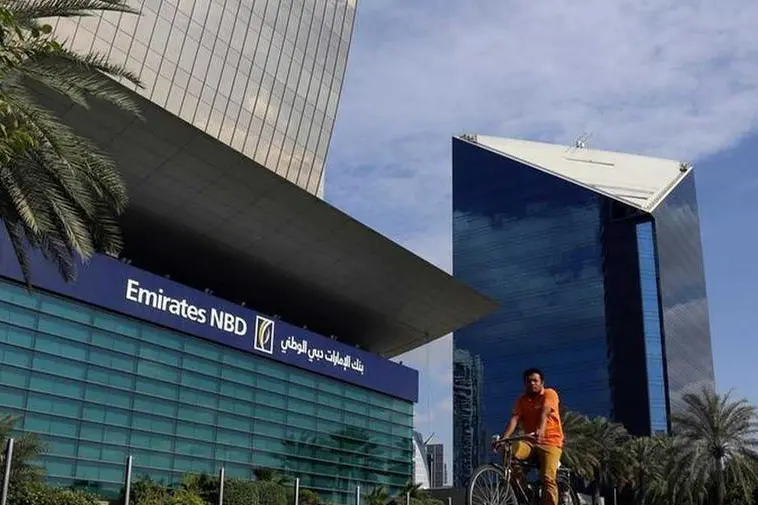PHOTO
Banks in the United Arab Emirates reported generally improved profits for the first six months of the year, as interest rate rises and lower provisions against bad debts boosted returns.
Dubai's biggest bank, Emirates NBD, reported on Wednesday that its half-year profit for the six-month period increased by 29 percent year-on-year, hitting just over 5 billion UAE dirhams ($1.36 billion). The bank cited a 20 percent increase in net interest income due to a growth in its loan book and an improvement in margins, as well as a 40 percent improvement in the amount of provisions made.
Also on Wednesday, Dubai Islamic Bank said that its net profit for the first half of the year had increased by 14 percent to 2.44 billion dirhams, and said that its non-performing financing (NPF) ratio had also improved. The bank raised over 1.6 billion dirhams through an oversubscribed rights issue last month to improve its liquidity, and chief executive Dr Adnan Chilwan said in a press statement accompanying yesterday's results that the fundraising has "created capacity for further growth, allowing us to continue to unlock the potential that the franchise offers both in terms of financial strength and market leadership".
After markets closed on Wednesday, Dubai's Mashreqbank announced that its year-on-year net profit increased during the first half of the year by 5.2 percent to 1.16 billion dirhams, with the firm citing a 9.6 percent reduction in its impairment allowance, and chairman Abdulaaziz Al Ghurair hailing "increased operational efficiencies" through its adoption of new technologies.
Earlier in the week, Abu Dhabi Islamic Bank reported a 3 percent increase in group net profit for the first half of the year to 1.16 billion dirhams on Monday, despite a 3 percent decline in group revenue. Again, it cited an improvement in terms of the quality of its loan book, with credit provisions and impairments declining by 17.2 percent to 315.2 million dirhams. National Bank of Fujairah said on Tuesday that its net profit increased by 10.4 percent to 310 million dirhams, with the bank citing "enhanced balance sheet management in a rising interest rate environment" as a reason for higher operating income.
Union National Bank (UNB) was one of the few institutions reporting more downbeat results during the period. UNB's net profit for the period declined by 12 percent to 841 million dirhams, which it blamed on lower non-interest income as it made less in fees and commissions, as well as smaller gains on foreign exchange derivatives.
On Sunday, financial services firm Alvarez & Marsal published its analysis of the UAE's biggest banks' performance during the first quarter of 2018. It said that most UAE banks managed to improve returns on equity as both operating expenses and their costs of risk decreased. The cost of risk for UAE's 10 biggest banks fell to an average of 0.84 percent in the first quarter, down from 1.04 percent in the last quarter of 2017 due to lower provisioning for bad loans.
Saeeda Jaffar, managing director of Alvarez & Marsal's Dubai office, told Zawya in an emailed response to questions that with the exception of the final quarter of 2017, the lower provisioning was a trend that had been seen for the previous five quarters.
"At the same time, loans have been increasing for the same quarters," she said. "This means either banks are giving out loans to less risky segments or the economy as a whole continues to be stable."
Further reading:
- Banks' strong earnings boost Dubai, other markets mixed
- Sharjah Islamic Bank posts $77mln net profit in 6 months
- UAE firms have up to $1bln exposure to Abraaj Group
- UAE banks to record higher profitability and liquidity through 2018: Report
- First Abu Dhabi Bank sells NBAD Jordan operations to SGBJ
- Emirates Islamic announces first half 2018 financial results
(Reporting by Michael Fahy; Editing by Shane McGinley)
Our Standards: The Thomson Reuters Trust Principles
Disclaimer: This article is provided for informational purposes only. The content does not provide tax, legal or investment advice or opinion regarding the suitability, value or profitability of any particular security, portfolio or investment strategy. Read our full disclaimer policy here
© ZAWYA 2018





















